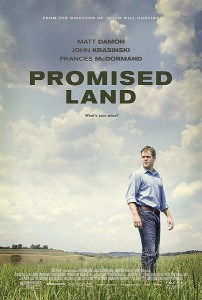Promised Land
Posted on January 3, 2013 at 6:00 pm
 “Promised Land,” written by stars Matt Damon and John Krasinski is smart, sincere, and timely, well directed by Gus Van Sant and with thoughtful, intelligent performances by everyone, especially Frances McDormand (“Fargo”) and Titus Welliver (“The Good Wife”). It’s a very good movie until it goes completely off the rails at the end.
“Promised Land,” written by stars Matt Damon and John Krasinski is smart, sincere, and timely, well directed by Gus Van Sant and with thoughtful, intelligent performances by everyone, especially Frances McDormand (“Fargo”) and Titus Welliver (“The Good Wife”). It’s a very good movie until it goes completely off the rails at the end.
Steve Butler (Damon) is about to get promoted for his outstanding record selling fracking to farmers. He says what makes him successful is that he grew up in communities like the ones he is selling to (“football Fridays and cow tipping”), and he knows enough to stop at the local bar (Welliver is the bartender) when he gets to town to get acquainted and buy clothes from the local store to help him fit in. He’s a modern day Professor Harold Hill, telling the people in the town that they’ve got trouble with a capital T and that rhymes with B — for bankruptcy. The answer is a capital G for gas, and that may not rhyme with M for millionaire, but it still sounds pretty good.
But what really makes him successful is that he truly believes that he is helping them. No, more than helping them; he believes he is saving them. Steve saw his own farm community collapse when a factory closed down. So when he sits across the kitchen table from a farm family and says he understands exactly what their financial struggles feel like, he is telling the truth. “I’m not selling them natural gas,” he says, “I’m selling them a way to get back.” When he tells the farmers — or lets them believe — that this is a great way for them to make money selling something they never even knew they had and will never miss, he almost believes that, too.
Steve’s partner is Sue Thomason (Frances McDormand), who cherishes very few illusions about what she is doing, and is very clear about why she is doing it — to support the son she Skypes with from too many hotel rooms. She knows how to talk to the women, mom to mom, about what the fracking money can mean to the community. “There’s no reason you shouldn’t have a state-0f-the-art high school,” she tells them. More money means better opportunities for the next generation. And Steve and Sue have a couple of additional and very powerful means of persuasion. When the local mayor says he might put up a fight, they pay him off (but not too much). And when farmers hesitate, they bring up that special quality of the gas they want to “harvest.” If the farmer says no, they can go to his neighbor and get it that way. So, it isn’t will you or won’t you say yes. It’s will you before they do? And Steve reminds them that “if you’re against this, you are for oil and coal, period.”
All seems to be going smoothly until two people who are not going to be bought off start to object. One is a local science teacher with a PhD (Hal Holbrook) who says that “the potential for error is just too high” and “money can lead very often to bad decisions.” The other is an cheerful environmentalist named — wait for it — Dustin Noble (Krasinski) who says that he, too, is from a farm community, and he has pictures of dead cows that he says were killed by fracking. He visits local schoolrooms and shows the children what it looks like when fields go up in flames. And because this is a movie, it isn’t enough that Steve and Dustin are on opposite sides in the struggle for the gas drilling rights and the soul of the town. There’s also a pretty teacher (Rosemary DeWitt) in town and both of them like her, too.
The battle escalates as Steve and Sue spread some money around and Dustin’s pictures shake up some of the local people. There is a Frank Capra-esque gathering in the school gym as everyone gets together for a big vote and Steve has to examine his own soul. As soon as Steve says, “None of this can be true, right? We would have heard about it,” we know that his essential goodness and passion for doing the right thing is creating an intolerable conflict. Up to that point, the movie has some respect for its audience and the complexity of its subject. But then it takes a big, dumb, veer into Hollywood nonsense that cheapens its message and leaves us feeling sullied.
Parents should know that this film has constant very strong language, some sexual references, drinking, a drinking game, and drunkenness. A character throws a punch.
Family discussion: How did Steve, Sue, and Dustin differ most in their priorities? What made them effective in persuading people in the town? Did you change your mind about who was right?
If you like this, try: “Gasland,” the documentary about fracking, and do some research into the extent of natural gas extraction and the scientific data about its impact. The movie “Local Hero” is a lighthearted story about a similar situation.
